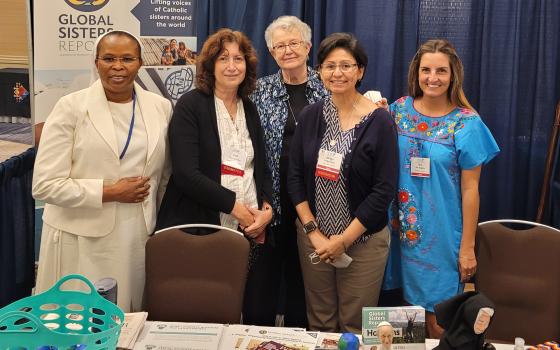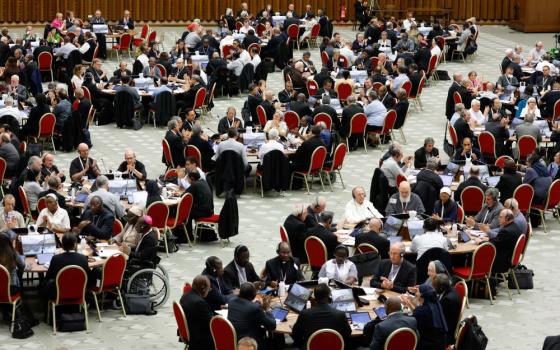The Vatican document outlining the initial working positions for October's highly anticipated global meeting of bishops on family life issues offers little to no clear indication of how world prelates have responded to Pope Francis' call to openly discuss difficult issues facing families, such as divorce and remarriage.
The document, which many anticipate as a possible barometer for how the bishops' discussions at the fall event might evolve, instead mainly focuses on restating many positions adopted at the meeting held last year with an occasional emphasis on showing mercy to those facing burdensome situations.
The document also appears to reiterate some of the culture-war language that has sometimes marked the church's language in recent decades and reaffirms the church's moral teaching in several areas, including the prohibition on the use of birth control.
It also does not seem to offer substantially new options for divorced and remarried people seeking the ability to take Communion in the church.
Released by the Vatican on Monday only in Italian, the document is the preparatory working instrument for October's Synod of Bishops, the second of two back-to-back global bishops' meetings on family life called by Francis.
The first meeting was held in October 2014 and concluded with the publication of a final document that seemed to narrow a tone of openness to modern society that had reportedly marked the bishops' two-week discussions.
Francis also warned bishops at the conclusion of that meeting against the temptation to "transform bread into stone and throw it against the sinners, the weak, and the sick -- to turn [the bread] into 'unbearable burdens.' "
Tuesday's document for the 2015 synod reprints many portions of the points of the final 2014 document as a launching pad for this October's meeting, but also adds a number of new arguments and positions.
The Vatican's office for the synod described the document as the fruit of its earlier call for bishops around the world to send in responses to a series of 46 questions meant to help prepare discussion for this October's meeting. The call is said to have resulted in thousands of pages of responses the office has had to organize and summarize.
At first reading, Tuesday's document, known in Latin as an instrumentum laboris, tries to balance a sense of openness and mercy with criticism of modern societies and ways of life.
Divided into three parts -- on listening to the family's challenges, discerning the familial vocation, and the mission of the family today -- the 78-page document opens by discussing the various cultural, social and anthropological changes facing families.
In one example of criticism of modern life, in its eighth paragraph, the document lists as among those challenges "a certain vision of feminism that considers maternity a pretext for the utilization of women and an obstacle to their full realization."
Included among other challenges: effects of the global economic downturn, poverty that touches many families globally, issues of social exclusion, lack of access to clean water, war, and the continuing migration crisis from north Africa and the Middle East.
In terms of taking an open tone toward real-life struggles of families, the document later declares: "The church must instill in families a sense of ecclesial belonging, a sense of 'us' in which no member is forgotten."
"All may be encouraged to grow in their abilities and to realize their true life in service of the Reign of God," it continues.
Later, the document also calls for open-mindedness toward Catholics who do not appear to be living in accordance with church teaching.
"A style of communication open to dialogue and free from prejudice is necessary particularly with regard of those Catholics that, in area of marriage and family, do not live, or are unable to live, in full accordance with the teachings of the church," it states.
Taking up the issue of divorce in its third section, the document mentions discussions that there could be some sort of "penitential path" for people who have been divorced and remarried without first obtaining annulments in order to allow them access to the sacraments.
But the document suggests that such a path would require such people to refrain from having sex in their new relationships before they could take Communion.
Current church teaching prohibits people who divorce and remarry without obtaining an annulment of their first marriage from taking Communion. Discussions at the 2014 synod are known to have focused on that prohibition, asking if the church might be able to change to allow some sort of penitential way to give remarried people access to the Eucharist.
Stating that there was a "common agreement" among bishops for the discussion of some sort of new process to welcome divorced and remarried people, the document says the discussions suggested a way of "taking consciousness of the failure" of the first marriage "with penitence."
Yet it states those discussions also included verifying the nullity of the first marriage and a commitment by the remarried person "to spiritual communion and a decision to live in continence."
Noting, however, that some bishops stressed the need to better accompany divorced people in their spiritual lives, the document also suggests that their exclusion from some ministries in the church in some places -- such as serving as a lector -- could come to an end.
The church might need to "rethink the forms of current exclusion practiced in the liturgical-pastoral field," the document states.
The document also says there was an "ample consensus" among the world's bishops that processes to annul marriages be made "more quick and accessible, and possibly free."
The document also acknowledges challenges that individuals who wish to use birth control face, saying they are "constantly" struggling to reconcile two poles of thought: what their conscience is saying to them about the morality of contraception and what the "objective moral indication" says about its use.
"When the subjective poll prevails, the risk is easy, selfish choices," the document states. "In the other case, the moral norm feels like an unsupportable weight, not responding to the needs and possibilities of the person."
"The marrying together of the two aspects, lived with the accompaniment of a competent spiritual guide, will help the spouse to make fully humanized choices and conform to the will of the Lord," it continues.
Yet earlier in its considerations, the document states a need for "responsible procreation."
"The generative action must be understood in the optic of responsible procreation and of the commitment to take care of children with fidelity," it states in a section on the "fecundity" of spouses.
Addressing particularly the role of women in family life, the document says that so-called "feminine emancipation" in Western countries "demands a rethinking of the work of the spouses in their reciprocity and in their common responsibility toward family life."
It also seems to criticize the process of in vitro fertilization, saying, "The desire of a child 'at any cost' has not brought happier or more solid family relations."
In many cases, it states, that desire "has aggravated the inequality between women and men."
It continues: "A better appreciation of women's responsibility in the church can contribute to the recognition of their determinate role: Their intervention in decision process; their participation, not only formal, to the governance of some institutions; their involvement in the formation of ordained ministers."
The document contains a short, three-paragraph section on ministering to gay people, "Pastoral attention to persons with homosexual tendencies."
"Every person, independently of their sexual tendencies, is respected in their dignity and should be received with sensibility and delicateness, both in the church and in society," the document states.
"It would be desirable that diocesan pastoral projects reserve a specific attention to the accompanying of families with persons of homosexual tendencies, and of the persons themselves," it continues.
Speaking about the family as a place where future priests are sometimes formed, Tuesday's document also proposes that seminarians live with a family for a time to better understand their struggles.
"It is clearly perceived a growing need to include families, in particular the feminine presence, in priestly formation," it states. "It is suggested that seminarians, during their formation, live for an appropriate period with their family so they may be guided in ... taking adequate consciousness of the current situations of families."
A short preface by Cardinal Lorenzo Baldisseri, the secretary general of the Vatican's synod office, precedes the document. It concludes with a prayer to the Holy Family and entrusts the work of the upcoming synod meeting to them.
The synod meeting is to be held Oct. 4-25 at the Vatican and is expected to see several hundred bishops come to Rome for the discussions.
The Vatican has been releasing the names of those bishops -- elected by bishops' conferences and then confirmed by Francis -- periodically as the pope gives his affirmation to bishops' elections from various parts of the world. Up to now, the Vatican has not announced the participation of any women in the discussions.
As of this point, the United States is to be represented at the synod by Louisville, Ky., Archbishop Joseph Kurtz, president of the U.S. bishops' conference; Galveston-Houston Cardinal Daniel DiNardo, vice president of the conference; Philadelphia Archbishop Charles Chaput; and Los Angeles Archbishop Jose Gomez. Metropolitan William Skurla of the Byzantine Catholic Archeparchy of Pittsburgh is also to attend.
[Joshua J. McElwee is NCR Vatican correspondent. His email address is jmcelwee@ncronline.org. Follow him on Twitter: @joshjmac.]







